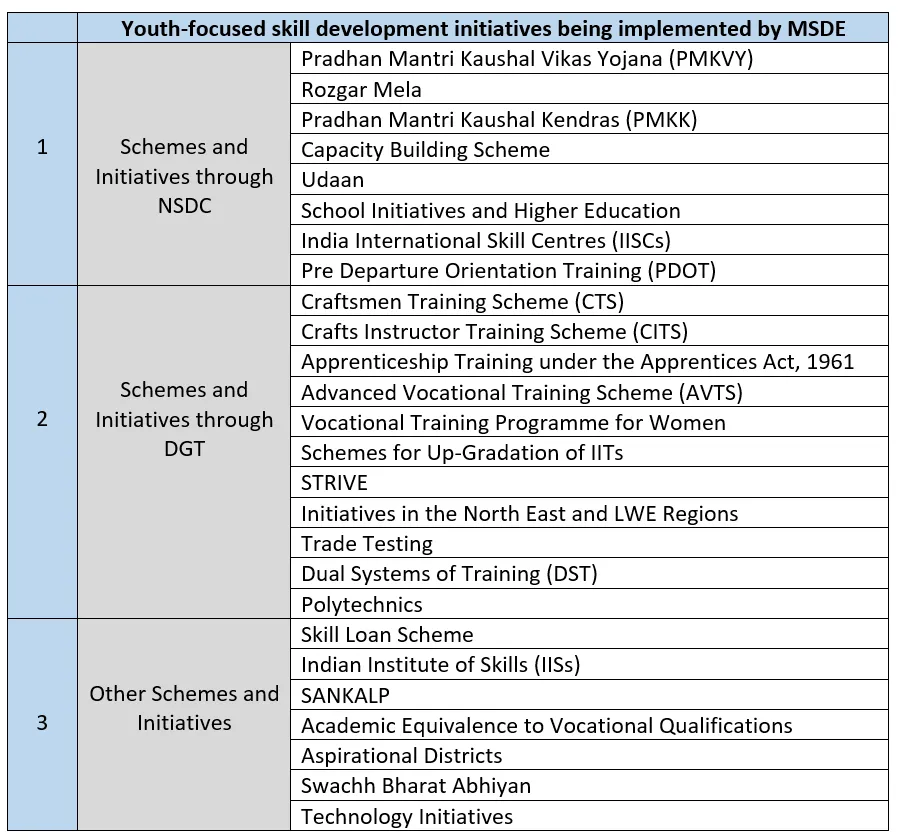
As India turns 75, its world of work is in a state of transition. Rapid digitisation and technological change are both a cause and a symptom, with companies increasingly adopting time-saving and quality-improving tech—ranging from basic digital tools to integrated 4IR technologies. The rise of a fast-expanding pool of working professionals that currently stands at over
400 million, paired with an emerging ICT-enabled hybrid work culture across the country, is further driving change on an unprecedented scale.
On the whole, companies in India remain optimistic about the need to hire additional workers as a result of the introduction of new technologies. According to a
survey in 2020, 33 percent of companies reported the need to recruit more workers owing to their digital transformation efforts, compared to 19 percent which saw a reduction in the number of workers.
Disturbingly, however, companies have voiced a growing concern about the gaps in the skills required of workers. These worries appear to have been exacerbated in the last two years. In 2020, Indian companies had identified skill gaps as their greatest barrier, representing
34 percent of the challenges they experienced. In 2022, this has risen to
60 percent. A Gartner study has found, for instance, that the Indian IT industry now sees the lack of talent as the most significant barrier (65 percent) to adopting a spectrum of emerging technologies at a time when the demand for the latter is expected to grow twenty-fold by 2024.
The rise of a fast-expanding pool of working professionals that currently stands at over 400 million, paired with an emerging ICT-enabled hybrid work culture across the country, is further driving change on an unprecedented scale.
These skill gaps and cases of insufficiently nurtured talent will handicap young Indians entering and rising through the workforce, and will ultimately prove detrimental to the competitiveness of their employers. As India celebrates World Youth Skills Day 2022, therefore, the country’s skilling ecosystem must take further steps to address these lacunae, equipping youth to become key drivers of a 4IR-ready India in a digital century.
Indian initiatives for the digital skilling of youth
Recognising the changing nature of job profiles and the need for new skills, the Indian government has crafted several new policies and programmes to impart digital skills, training and knowledge to youth. The Digital India Mission, the government’s flagship programme for digital transformation, comprises nine pillars or growth areas. One of them is “
IT for Jobs” which focuses on “providing training to the youth in the skills required for availing employment opportunities in the IT/ITES sector".
10 million youth are to be trained for jobs in the IT sector, and the programme is currently being implemented collaboratively by various government ministries and departments.
In 2015, the National Skill Development Mission (NSDM) was launched to create “
convergence across sectors and States in terms of skill training activities”. Under the NSDM, the National Skill Development Corporation (NSDC) was set up by the Ministry of Skill Development and Entrepreneurship (MSDE) following a public-private partnership model to execute a spate of initiatives for skill development. For example,
e-Skill India—an e-learning aggregator—has been established by the NSDC to consolidate business-to-consumer e-learning portals for the skilling ecosystem, and for creating and sourcing e-learning content. The MSDE has also launched a variety of capacity-building initiatives, many of which focus on digital skills for youth.
 Source: “Emergence of India as the Skill Capital of the World: Possibilities and Path Ahead”
Source: “Emergence of India as the Skill Capital of the World: Possibilities and Path Ahead”
Joint curriculum development and training partnerships between the government and private sector help ensure that the skills being imparted make young Indians “industry ready”. Among other initiatives in this space, the NSDC has collaborated with tech players such as
WhatsApp,
Cisco,
LinkedIn,
IBM and
Simplilearn to develop youth digital skilling programmes; and the MSDE’s Directorate General of Training (DGT) has
partnered with Microsoft and the NASSCOM Foundation to create e-learning modules for students of Industrial Training Institutes across the country.
Other landmark schemes too have proven beneficial. The
Digital Saksharta Abhiyan (DISHA) has provided 4.25 million non-IT-literate citizens with digital skills, and the
Pradhan Mantri Gramin Digital Saksharta Abhiyaan (PMGDISHA) aims to make 60 million people in rural areas digitally literate and enable them to perform basic functions on computers and other digital devices. While these schemes have not exclusively targeted youth, their eligibility pool of 14–60 years ensures that a significant proportion of youth has gained from them.
The Finance Minister announced the launch of the pioneering DESH Stack e-portal to provide citizens with skilling, upskilling and reskilling opportunities through online training and API-based platforms.
In 2022, two major government interventions have added to India’s arsenal of digital skilling initiatives. When presenting the Union Budget 2022–23, the Finance Minister announced the launch of the pioneering
DESH Stack e-portal to provide citizens with skilling, upskilling and reskilling opportunities through online training and API-based platforms. And as recently as June 2022, the Union Minister of Education and Skill Development launched a
digital skilling programme focused specifically on emerging and future technologies, which will train 10 million students in the areas of disruptive and emerging tech through certifications, internships, apprenticeships and employment. It will be a sprawling, ambitious exercise involving multiple ministries, government agencies and tech firms. With nearly one million students enrolling within a week of its launch, the programme is off to a promising start.
Closing the digital skills gap
Despite the depth and breadth of the digital skilling initiatives outlined above, major gaps persist, which are a growing cause of concern for Indian youth, their employers, and the nation.
While there has been a marked push towards job-specific and technical skills required for finding work, education matters, and employers do value educational attainment among potential entrants or additions to the workforce. The
India Skills Report 2022, however, suggests that only
48.7 per cent of India’s educated youth are employable. Indeed, the stark gap between industry requirements and the learning imparted by higher education institutes has prompted the private sector—and tech firms in particular—to step in and design foundation courses and in-service learning modules so elaborate that they, in effect, are “substituting for the traditional university”. Companies end up “imparting skills that the new employees should have ordinarily learned at university”.
But for those who do not enrol in niche skilling programmes, or fail to find jobs and avail of the training offered, the lack of work-facing digital skills is a bleak reality. This comes at an economic cost. Today, India’s digital skills gap poses the greatest GDP growth risk (an average of
2.3 percentage points every year) among the G20 countries.
Firms currently anticipate strong demand for technical skills and knowledge about technology design, digital privacy, cybersecurity, cloud architecture design, the Internet of Things (IoT), big data, data analytics and informatics, AI, Deep Learning and Machine Learning.
Broadly, India’s digital skilling programmes need to be much more responsive to emerging priority areas in the field of technology. Regular consultations with the private sector, and the latter’s involvement with course design and content—not just for extracurricular skilling programmes but for university curricula as well—are crucial. Firms currently anticipate strong demand for technical skills and knowledge about
technology design, digital privacy, cybersecurity,
cloud architecture design, the Internet of Things (IoT),
big data, data analytics and informatics, AI, Deep Learning and Machine Learning. Skilling initiatives must urgently address these needs and ameliorate the talent crunch among youth.
Besides technical competencies, however, core human-centric attributes need to be developed as well. As Klaus Schwab points out in his classic
The Fourth Industrial Revolution, “demand will increase for skills that enable workers to design, build and work alongside technological systems, or in areas that fill the gaps left by these technological innovations”.
This is borne out by the
Indian experience, with reports on digital skills consistently calling for qualities such as creativity, social intelligence, teamwork, adaptability, and superior communication skills in workers.
Certain features of skill development programmes are
especially attractive to youth. Young Indians are keen to receive a certification—a credential they can formally showcase. They prefer intensive programmes of between two weeks and six months, which combine online and classroom components. A majority of youth report a preference for initiatives that offer compensation such as a stipend, and a credential from a private firm is deemed useful. The principal barrier youth face however is a lack of awareness about available opportunities and a perception that existing programmes may not meet their training needs.
The programme on emerging tech launched by the
MSDE in June 2022 appears in many respects to meet the criteria of what youth consider an “ideal” skilling initiative. More initiatives along these lines need to be devised and vigorously promoted. The national demand for digitally skilled workers is expected to increase
nine times by 2025—this is an unmissable opportunity to put young India first and equip it for the future.
Vivan Marwaha,
What Millennials Want: Decoding the World’s Largest Generation (New Delhi: Penguin Viking, 2021), pp. 37–8.
Klaus Schwab,
The Fourth Industrial Revolution (London: Portfolio, 2017)
The views expressed above belong to the author(s). ORF research and analyses now available on Telegram! Click here to access our curated content — blogs, longforms and interviews.



 As India turns 75, its world of work is in a state of transition. Rapid digitisation and technological change are both a cause and a symptom, with companies increasingly adopting time-saving and quality-improving tech—ranging from basic digital tools to integrated 4IR technologies. The rise of a fast-expanding pool of working professionals that currently stands at over
As India turns 75, its world of work is in a state of transition. Rapid digitisation and technological change are both a cause and a symptom, with companies increasingly adopting time-saving and quality-improving tech—ranging from basic digital tools to integrated 4IR technologies. The rise of a fast-expanding pool of working professionals that currently stands at over 
 PREV
PREV



